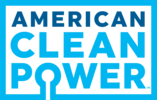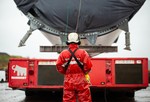News Release from American Clean Power Association (ACP)
Wind Industry Profile of
05/25/2011
AWEA - CEO Denise Bode arrives at WINDPOWER 2011's opening session on custom-made wind power inspired motorcycle
With roars from a custom motorcycle and crowd laughter, the WINDPOWER 2011 Conference & Exhibition got underway with a big shot of energy in Anaheim, Calif., on Monday.
Speaking at WINDPOWER 2011's opening session was legendary business leader Ted Turner. "I've never seen anything more clear as the case for wind energy, solar power, and geothermal energy," said Turner, stating that embracing renewables is even more of an obvious business decision for him today than launching eventual cable giant CNN was in 1980.
Echoing the calls of wind energy advocates, Turner, who got involved through his Turner Renewable Energy venture, underscored that stable policy incentives—such as those under which other energy sources operate—are essential to the continued growth of wind power. "They must be long-term incentives so we can plan intelligently," he said.
AWEA CEO Denise Bode arrived at the podium on a custom motorcycle inspired by wind power. Driving the bike was Dave Perewitz, the king of custom motorcycle fabricators, whose Great Biker Build-off series on the Discovery Channel has garnered much attention among bike enthusiasts. (Perewitz, who is working with Allstate to do a motorcycle-safety roadshow, will also be promoting wind power in magazine articles he writes.) Perewitz's American Wind Power chopper is on display this week in Hall E of the Anaheim Convention Center.
Bode noted the significance of WINDPOWER's return to California, where the industry began 30 years ago—and where a true renaissance is taking place today, particularly since the state recently passed a nation-leading, 33-percent-by-2020 renewables target. "Thirty years ago, the Golden State gave rise to a new wave in America's sea of electricity generation," she said. "It was California's unabashed vision that made it the perfect breeding ground for the beginning of the American wind energy development. Today, 30 years after those wind farms first appeared, the Golden State is once again challenging the nation, leading the charge."
In his trademark unrehearsed fashion, Turner, who participated in a Q&A format with Bode, provided insights into what America needs to reform its approach to energy.
Rep. Blumenauer a Champion of Wind; Gov. Schweitzer calls for energy security:
At Monday's opening session, Bode took the opportunity to give AWEA's Champion of Wind award to Rep. Earl Blumenauer, a long-time wind advocate. Blumenauer spoke eloquently on the wind industry's needs. He said to get America on the right path for energy, "Step No. 1 is to get the Production Tax Credit extended," referring to the industry's primary policy driver through the years, which expires at the end of 2012.
The story of the tax credit epitomizes the short-term policy approach that the industry has had to endure. It generally has been extended in one- and two-year increments, and even been allowed to expire before getting extended again. Wind farm advocates seek a long-term extension to provide the industry a predictable business environment so it can stay on track to produce 20 percent of America's electricity by 2030, the goal identified in the Bush Administration.
Meanwhile, providing his own brand of enlightenment was Montana Gov. Brian Schweitzer. He used Montana ranch-style anecdotes to describe the imperative for America to increase its energy independence. Schweitzer also compared the growth of domestic energy to the Apollo program to reach the moon and referenced Tom Brokaw's book, the Greatest Generation, on the contribution made by Americans during World War II.
"The question is," said Schweitzer, "can we be the Greatest Generation?" To become another such generation, he suggested, the nation must tap its own vast resources to develop clean, affordable American wind power.
WINDPOWER participants, stakeholders tackle BPA situation head-on:
At a press conference held at WINDPOWER 2011, conference participants and other stakeholders turned their full attention to Bonneville Power Administration's decision to take enough wind power off the grid in the past week to supply 160,000 homes for a week.
Just days away from WINDPOWER 2011, wind turbines in the Pacific Northwest began seeing the Bonneville Power Administration (BPA) break its contracts with them, because of what AWEA and the wind industry termed a wrongheaded decision that BPA announced May 13. BPA claims it can cut off wind's access to customers at will, change wind generators' contracts and abrogate BPA's own transmission agreements, even though less costly alternatives are available that BPA has chosen to ignore.
"No one is above the law," said AWEA Senior Vice President of Public Policy Rob Gramlich, speaking at the WINDPOWER press conference. "No one can break contracts as Bonneville has. Commerce cannot exist without contract sanctity."
Explaining that the BPA move is a "damaging precedent that will kill investment," Gramlich likened the federal utility's action to an air traffic controller that owns airplanes and is letting only its planes land."
"Bonneville Power is calling this a wind power vs. salmon issue," said Pat Ford, executive director of Save Our Wild Salmon, speaking via conference call at the WINDPOWER media availability. "That is wrong factually, and also the wrong approach if the goal is solutions that work for people, salmon, and West Coast economies."
Wind-powered cars:
With the auto industry officially having entered the electric car era, the connection between wind energy and transportation took concrete form at WINDPOWER 2011. An electric vehicle from Tesla with lithium ion batteries was on display, shimmering in the California sunshine in front of the Anaheim Convention Center as conference attendees passed by.
The opportunity to wind power your electric car has arrived. Several automakers, including American icons Ford and Chevrolet, are rolling out electric vehicles. That would be a good thing for consumers' wallets. Driving today costs over 15 cents a mile for gasoline, while running an electric car on wind power costs less than 3 cents a mile. That's like paying 70 cents a gallon at the pump, saving you over $1,400 a year (based on these assumptions: price of gasoline, $3.50/gallon; average miles per gallon 22.5; average miles driven per day, 32.)
www.awea.org
Speaking at WINDPOWER 2011's opening session was legendary business leader Ted Turner. "I've never seen anything more clear as the case for wind energy, solar power, and geothermal energy," said Turner, stating that embracing renewables is even more of an obvious business decision for him today than launching eventual cable giant CNN was in 1980.
Echoing the calls of wind energy advocates, Turner, who got involved through his Turner Renewable Energy venture, underscored that stable policy incentives—such as those under which other energy sources operate—are essential to the continued growth of wind power. "They must be long-term incentives so we can plan intelligently," he said.
AWEA CEO Denise Bode arrived at the podium on a custom motorcycle inspired by wind power. Driving the bike was Dave Perewitz, the king of custom motorcycle fabricators, whose Great Biker Build-off series on the Discovery Channel has garnered much attention among bike enthusiasts. (Perewitz, who is working with Allstate to do a motorcycle-safety roadshow, will also be promoting wind power in magazine articles he writes.) Perewitz's American Wind Power chopper is on display this week in Hall E of the Anaheim Convention Center.
Bode noted the significance of WINDPOWER's return to California, where the industry began 30 years ago—and where a true renaissance is taking place today, particularly since the state recently passed a nation-leading, 33-percent-by-2020 renewables target. "Thirty years ago, the Golden State gave rise to a new wave in America's sea of electricity generation," she said. "It was California's unabashed vision that made it the perfect breeding ground for the beginning of the American wind energy development. Today, 30 years after those wind farms first appeared, the Golden State is once again challenging the nation, leading the charge."
In his trademark unrehearsed fashion, Turner, who participated in a Q&A format with Bode, provided insights into what America needs to reform its approach to energy.
Rep. Blumenauer a Champion of Wind; Gov. Schweitzer calls for energy security:
At Monday's opening session, Bode took the opportunity to give AWEA's Champion of Wind award to Rep. Earl Blumenauer, a long-time wind advocate. Blumenauer spoke eloquently on the wind industry's needs. He said to get America on the right path for energy, "Step No. 1 is to get the Production Tax Credit extended," referring to the industry's primary policy driver through the years, which expires at the end of 2012.
The story of the tax credit epitomizes the short-term policy approach that the industry has had to endure. It generally has been extended in one- and two-year increments, and even been allowed to expire before getting extended again. Wind farm advocates seek a long-term extension to provide the industry a predictable business environment so it can stay on track to produce 20 percent of America's electricity by 2030, the goal identified in the Bush Administration.
Meanwhile, providing his own brand of enlightenment was Montana Gov. Brian Schweitzer. He used Montana ranch-style anecdotes to describe the imperative for America to increase its energy independence. Schweitzer also compared the growth of domestic energy to the Apollo program to reach the moon and referenced Tom Brokaw's book, the Greatest Generation, on the contribution made by Americans during World War II.
"The question is," said Schweitzer, "can we be the Greatest Generation?" To become another such generation, he suggested, the nation must tap its own vast resources to develop clean, affordable American wind power.
WINDPOWER participants, stakeholders tackle BPA situation head-on:
At a press conference held at WINDPOWER 2011, conference participants and other stakeholders turned their full attention to Bonneville Power Administration's decision to take enough wind power off the grid in the past week to supply 160,000 homes for a week.
Just days away from WINDPOWER 2011, wind turbines in the Pacific Northwest began seeing the Bonneville Power Administration (BPA) break its contracts with them, because of what AWEA and the wind industry termed a wrongheaded decision that BPA announced May 13. BPA claims it can cut off wind's access to customers at will, change wind generators' contracts and abrogate BPA's own transmission agreements, even though less costly alternatives are available that BPA has chosen to ignore.
"No one is above the law," said AWEA Senior Vice President of Public Policy Rob Gramlich, speaking at the WINDPOWER press conference. "No one can break contracts as Bonneville has. Commerce cannot exist without contract sanctity."
Explaining that the BPA move is a "damaging precedent that will kill investment," Gramlich likened the federal utility's action to an air traffic controller that owns airplanes and is letting only its planes land."
"Bonneville Power is calling this a wind power vs. salmon issue," said Pat Ford, executive director of Save Our Wild Salmon, speaking via conference call at the WINDPOWER media availability. "That is wrong factually, and also the wrong approach if the goal is solutions that work for people, salmon, and West Coast economies."
Wind-powered cars:
With the auto industry officially having entered the electric car era, the connection between wind energy and transportation took concrete form at WINDPOWER 2011. An electric vehicle from Tesla with lithium ion batteries was on display, shimmering in the California sunshine in front of the Anaheim Convention Center as conference attendees passed by.
The opportunity to wind power your electric car has arrived. Several automakers, including American icons Ford and Chevrolet, are rolling out electric vehicles. That would be a good thing for consumers' wallets. Driving today costs over 15 cents a mile for gasoline, while running an electric car on wind power costs less than 3 cents a mile. That's like paying 70 cents a gallon at the pump, saving you over $1,400 a year (based on these assumptions: price of gasoline, $3.50/gallon; average miles per gallon 22.5; average miles driven per day, 32.)
www.awea.org
- Source:
- American Wind Energy Association
- Author:
- Posted by Trevor Sievert, Online Editorial Journalist
- Email:
- windmail@awea.org
- Link:
- www.awea.org/...
- Keywords:
- wind, wind energy, wind turbine, rotorblade, awea, ewea, wind power, suppliers, manufacturerstrevor sievert



























